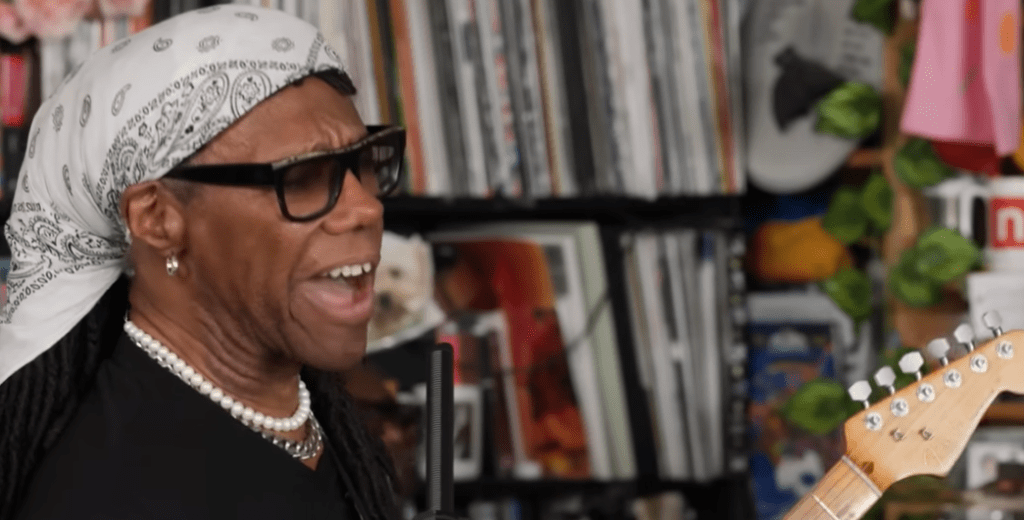Nile Rodgers Bio Table
| Full Name | Nile Gregory Rodgers Jr. |
|---|---|
| Date of Birth | September 19, 1952 |
| Age | 72 |
| Birthplace | New York City, United States |
| Occupation | Musician, Producer, Songwriter, Philanthropist |
| Instruments | Guitar, Vocals |
| Net Worth (Estimated) | $200 Million |
| Notable Associated Acts | Chic, David Bowie, Madonna, Daft Punk |
| Major Hits | “Le Freak,” “Good Times,” “Get Lucky” |
| Awards | 6 Grammys, Rock and Roll Hall of Fame |
| Official Website | nilerodgers.com |

Nile Rodgers’ estimated $200 million net worth is the result of decades of creativity, tenacity, and strategic foresight rather than just his musical prowess. He is a shining example of long-term creative and financial success because of his extraordinary ability to influence culture while making money. With the help of well-written songs and especially significant collaborations, Rodgers turned his guitar into a wealth generator, giving every chord more than just sound.
Growing up in an unstable and addicted household, Rodgers learned early in his career to turn suffering into accuracy. His guitar had evolved into a launchpad by the time he and Bernard Edwards formed Chic. In addition to topping the charts, their hits “Le Freak” and “Good Times” left cultural imprints. Particularly, “Good Times” has been sampled innumerable times, greatly impacting the emergence of hip-hop and helping to fund Rodgers’ royalties, which still generate a respectable income today.
Using Rodgers’ catalog was not just a tribute for musicians such as Queen, Will Smith, and The Notorious B.I.G.; it was a calculated move. By incorporating “Good Times” into brand-new songs, they capitalized on a rhythm that was already ingrained in the collective consciousness. In exchange, Rodgers kept making money with every version, demonstrating how songwriting can be a very resilient asset.
Nile Rodgers was moving with deliberate energy by the 1980s. He produced Diana Ross’ Diana, David Bowie’s Let’s Dance, and Madonna’s Like a Virgin as disco gave way to rock and pop. These initiatives were profitable in addition to having cultural significance. His 2013 collaboration with Daft Punk, whose song “Get Lucky” achieved platinum status worldwide, was especially advantageous. He won three Grammys for that project alone, which also brought his earlier work back into the spotlight.
By changing with the times, Rodgers maintained his relevance, in contrast to many musicians who become obsolete. Through corporate endeavors, television appearances, and music production, he developed strategic relationships that significantly increased his financial security. One particularly creative step he took in 2018 was co-founding the Hipgnosis Songs Fund. He realized that nostalgia could be profited from as predictably as real estate, so he invested in song catalogs, effectively turning musical memory into financial stock.
Rodgers has a humanitarian spirit in addition to his business sense. He is one of the co-founders of the We Are Family Foundation, which fosters youth-led initiatives and encourages world peace. He has made investments in songs as well as in the next generation, so his wealth has an impact that goes beyond selfish interests. His $1 million gift on his 70th birthday demonstrates a strategic and giving commitment, enhancing his legacy through significant influence.
The financial story of Nile Rodgers is so adaptable because it is independent of prevailing patterns. His catalog would still be making money from streaming, licensing, and commercial use even if he stopped making music today. His earnings can surpass those of younger, year-round touring artists due to the high efficiency of this passive income model. His Fender Stratocaster, lovingly referred to as “The Hitmaker,” has been featured on songs that have sold over $2 billion in music, a startling figure that forms the cornerstone of his fortune.
Over the last ten years, Rodgers has regained popularity as a contemporary, avant-garde artist rather than merely as a relic. Rodgers continues to be in demand, from playing guitar on Beyoncé’s Cowboy Carter to appearing on NPR’s Tiny Desk with Chic. He guides trends rather than following them. This quality has made his financial situation incredibly stable, especially when combined with his unwavering dedication to craftsmanship.
Rodgers has received new Grammy nominations in recent years, played with Keith Urban, and featured on Coldplay’s most recent album. His enduring and legally protected catalog still performs better than many more recent assets. Rodgers’ music library is a case study in compound returns for tech investors who recognize the value of intellectual property.
Additionally, Rodgers’ wealth is symbolic. It demonstrates how ownership and astute licensing can help artists—particularly historically underpaid Black artists—regain financial control. His success is societal in nature rather than merely personal. It reinterprets what wealth in music can mean and questions established hierarchies. It demonstrates that taking ownership of your past can yield greater rewards than striving for the future.
His tale, which is characterized by perseverance, recovery, and reinvention, is remarkably similar to those of cultural icons who have switched from notoriety to wealth. Similar to Quincy Jones or Jay-Z, Rodgers has skillfully combined the creative and commercial aspects of music. Additionally, his worth increases due to contracts, copyrights, and his timeless sound, unlike ephemeral celebrity fortunes.
